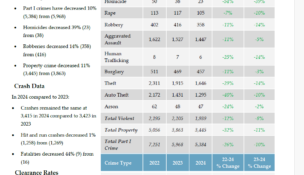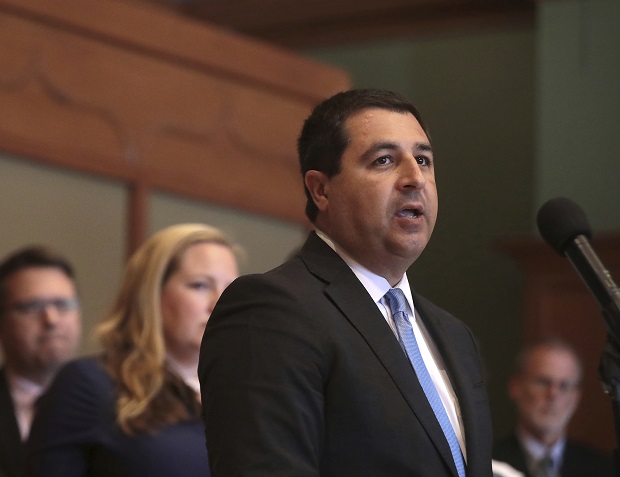Defendants must be told about Truth in Sentencing
By: dmc-admin//February 4, 2004//
 |
|
“Because the court did not inform Uhde that Wisconsin’s Truth in Sentencing legislation mandates that he serve each day of confinement imposed by the court, and because Uhde asserted that he did not understand this information, Uhde has made a prima facie showing that the plea was not knowing, voluntary and intelligent.” Hon. Charles P. Dykman |
Trial courts are required to inform defendants during the plea colloquy that Wisconsin’s Truth in Sentencing legislation mandates that they serve each day of confinement imposed, the Wisconsin Court of Appeals held on Jan. 29.
On Jan. 28, 2002, Douglas K. Uhde pleaded no contest to (1) burglary while using a dangerous weapon, (2) carrying a concealed weapon (CCW), (3) possession of a short-barreled shotgun, and (4) felon in possession of a firearm (FIPOF).
Adams County Circuit Court Judge James Miller sentenced him as follows: 10 years in prison and seven years extended supervision for burglary; lesser, concurrent sentences for the two remaining felonies; and 225 days, consecutive, in the local jail for CCW. The sentence was later amended for reasons not relevant to the appeal.
Uhde moved to withdraw his no contest pleas, asserting the following grounds: (1) the plea questionnaire listed the maximum penalty for a FIPOF as two years when the actual maximum penalty was five years; (2) the questionnaire failed to set forth the maximum penalty for CCW as nine months; (3) the court failed to set forth all the elements of burglary; (4) the court failed to set forth the proper elements of the dangerous weapon penalty enhancer; and (5) the trial court was required to inform him that Wisconsin’s Truth in Sentencing legislation mandates that he serve each day of confinement imposed by the court.
In support of the last argument, Uhde claimed he first learned about Truth in Sentencing while incarcerated, and that, when he entered his pleas, he assumed that Wisconsin used probation and good-time credits, because he had served time in Michigan and Texas, where such practices were in place.
The trial court denied the motion, and Uhde appealed. The court of appeals reversed in a decision by Judge Charles P. Dykman.
Direct Consequence
The court held that due process requires that defendants be informed, prior to entering their pleas, that they must serve every day imposed, because it is a direct, rather than collateral, consequence of the plea, relying on State v. Byrge, 2000 WI 101, 237 Wis.2d 197, 614 N.W.2d 477. Only direct consequences of pleas must be known to the defendant for the plea to comport with due process requirements.
|
What the court held Case: State of Wisconsin v. Douglas K. Uhde, No. 02-3135-CR. Issue: Must a court inform a defendant, when accepting a guilty plea, that Wisconsin’s Truth in Sentencing law mandates that he serve each day of confinement? Holding: Yes. The absence of possibility for parole directly reflects the potential punishment. Counsel: Charles B. Vetzner, Madison, for appellant; Mark D. Thibodeau, Friendship; Lara M. Herman, Madison, for respondent . |
In Byrge, the Wisconsin Supreme Court defined a “direct consequence of a plea” as “one that has a definite, immediate, and largely automatic effect on the range of a defendant’s punishment. If a defendant is not aware of the direct consequences of a plea, he or she is not appraised of ‘the potential punishment’ under Wis. Stat. sec. 971.08(1)(a).” Byrge, par. 60.
The court in Byrge reversed the plea at issue in that case, because the trial court did not inform the defendant of parole eligibility information, when the sentence is life imprisonment. At the time Byrge pleaded guilty, a sentencing judge could either set a date for parole eligibility, or leave it to the Department of Corrections.
The State argued that the B
yrge decision was limited to life imprisonment cases, citing the court’s statement that its holding applies only “in the narrow circumstance in which a circuit court has statutory authority … to fix the parole ….”
Rejecting the argument, the court of appeals stated, “We interpret Byrge to have broader implications. Byrge required the trial court to explain the sentencing process to Byrge before accepting a plea because Byrge was unaware that he faced a maximum sentence and that the trial court had discretion to determine his parole eligibility.”
The court added, “We cannot meaningfully distinguish Byrge from the sentencing process provided by Wis. Stat. sec. 973.01. Truth in Sentencing imposes a maximum or fixed penalty and requires the trial court to exercise discretion in allocating the sentence between the confinement and supervision terms in a bifurcated sentence. This exercise of discretion is indistinguishable from Byrge because in both cases the trial court fixed the defendant’s release from confinement. Thus, Truth in Sentencing, like a parole eligibility determination, has ‘a definite, immediate, and largely automatic effect on the range’ of punishment (cites omitted).”
The court also rejected the State’s reliance on the holding in Birts v. State, 68 Wis.2d 389, 397, 228 N.W.2d 351 (1975), that the defendant could not withdraw his pleas, because his “beliefs concerning his release time were the product of his own mind and entirely unexpressed in the plea bargaining process.”
The court noted that the trial court in Birts had no discretion to fix the parole date, because the power rested with the department of health and social services.
| |
||
|
Links Related Article |
||
| |
||
The court reasoned, “In contrast, Truth in Sentencing provides certainty comparable to that in Byrge. We conclude that, like parole eligibility, Truth in Sentencing implicates punishment and constitutes a direct consequence of the plea, according to the requirements of Wis. Stat. sec. 971.08(1)(a). Because the court did not inform Uhde that Wisconsin’s Truth in Sentencing legislation mandates that he serve each day of confinement imposed by the court, and because Uhde asserted that he did not understand this information, Uhde has made a prima facie showing that the plea was not knowing, voluntary and intelligent under [State v. Bangert, 131 Wis. 2d 246, 274, 389 N.W. 2d 12 (1986)].”
Accordingly, the court reversed.
Prima Facie Case
As to the other defects alleged by Uhde, the State conceded that Uhde made a prima facie case that the entry of the plea was defective. Although the State argued that the record demonstrated that the pleas were entered knowingly, voluntarily, and intelligently, the court concluded that it was for the trial court to determine whether the State could rebut Uhde’s prima facie showing on remand.
Click here for Case Analysis.
David Ziemer can be reached by email.
Legal News
- MPD: Milwaukee homicides down nearly 40 percent compared to last year
- EVERS: Republican lawmakers No-Show at special meeting to release statewide PFAS funding, stabilize healthcare access
- Wisconsin ICAC Task Force conference on Missing and Exploited Children highlights increase in sextortion cases
- More than 300 Wisconsin officers back in law enforcement after being fired or forced out
- Former Trump staffer who said to ‘fan the flame’ after 2020 loss hired to lead Wisconsin GOP
- Gov. Evers appoints David Casey to Serve as DOR Secretary
- ABA names 34th Annual Margaret Brent Women Lawyers of Achievement Awards honorees
- FBI launches criminal investigation into Key Bridge collapse
- Man charged in slaying after woman’s leg found at Milwaukee-area park
- Minnesota man guilty in fatal stabbing of teen on Wisconsin river, jury finds
- Wisconsin teen sentenced in bonfire explosion that burned at least 17
- Wisconsin man who broke into home, ate victim’s chicken, slept in victim’s bed, receives prison and jail sentences
WLJ People
- Power 30 Personal Injury Attorneys – Russell Nicolet
- Power 30 Personal Injury Attorneys – Benjamin Nicolet
- Power 30 Personal Injury Attorneys – Dustin T. Woehl
- Power 30 Personal Injury Attorneys – Katherine Metzger
- Power 30 Personal Injury Attorneys – Joseph Ryan
- Power 30 Personal Injury Attorneys – James M. Ryan
- Power 30 Personal Injury Attorneys – Dana Wachs
- Power 30 Personal Injury Attorneys – Mark L. Thomsen
- Power 30 Personal Injury Attorneys – Matthew Lein
- Power 30 Personal Injury Attorneys – Jeffrey A. Pitman
- Power 30 Personal Injury Attorneys – William Pemberton
- Power 30 Personal Injury Attorneys – Howard S. Sicula











